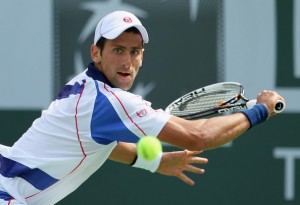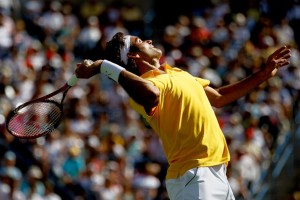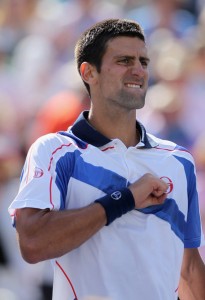Indian Wells, Semifinal
Djokovic d. Federer, 6/3 3/6 6/2
By defeating Roger Federer in the second of today’s Indian Wells semifinals, Novak Djokovic regained the No.2 ranking. Tomorrow he will face world No.1 Rafael Nadal in the final. If Nadal wins, it would be his first title since Tokyo last September, and his first Masters 1000 victory since Madrid in May. For Djokovic, however, it will be his first Masters title since the  Paris Indoors in November 2009, which is also the last time he progressed to the final round. In other words, there’s plenty at stake.
Paris Indoors in November 2009, which is also the last time he progressed to the final round. In other words, there’s plenty at stake.
I’ve suggested recently that the numerous Djokovic-Federer encounters – eight of them since Wimbledon last year, split evenly – have showcased every possible permutation of their respective abilities, except the one that matters most. We have not seen them both performing at their peaks for a whole match. After today, I suspect we won’t, because they can’t. Federer’s game is built around near-relentless attack, while Djokovic’s rests upon spectacular defensive movement and the saintly patience with which he continually resets each point. When both are operating at full throttle, it makes for some spectacular points – there were some jaw-droppers today – but it cannot be sustained. Something usually gives, and then something else does. Their matches are invariably marked by sudden and definitive momentum shifts. Again, today was no different.
A great deal depends on the conditions. On a fast court, Federer’s offence gains a serrated edge. On a slower court, the edge is merely ragged, and Djokovic grows increasingly impenetrable. It isn’t the whole story, but no synopsis would be complete without it. Indeed, it is revealing that today’s result is a near-mirror of last November’s Basel final, which Federer won 6/4 3/6 6/1. That was a fast indoor court, momentum oscillated dramatically, and Djokovic fell apart in the final set. Today the reverse occurred. Federer had seemingly wrested back control when he broke to love early in the third, then moved swiftly to 40-15 on serve. From there, he never looked in it.  As with his opponent in Basel, Djokovic did little to impress in the closing stages, and indeed was nearly broken while serving for it. Nonetheless, Federer was by now too frustrated for a fightback, and it was Djokovic pummeling his chest and roaring sweet everythings at the crowd some minutes later.
As with his opponent in Basel, Djokovic did little to impress in the closing stages, and indeed was nearly broken while serving for it. Nonetheless, Federer was by now too frustrated for a fightback, and it was Djokovic pummeling his chest and roaring sweet everythings at the crowd some minutes later.
This sense of frustration is worth dwelling on, for it unlocks the issue. Rather too much is made of unforced errors – Federer himself has always been more willing to commit them than ruminate on them – especially their perceived equivalence to winners. The relationship is vaguely indicative on an industrial scale – say, across a season – but is generally worse than useless within the scope of a given match. Federer hit something like 15 unforced errors in the first set today, which suggests that his level was poor, although it wasn’t. Few of those errors came early in the point. Most came at the end of protracted exchanges, in which Federer would repeatedly probe the lines and corners, only to have the ball reappear up the centre of the court and land within a yard or two of the baseline, with his opponent flowing smoothly back into position. Federer wasn’t trying to hit winners with these shots, but he was trying to maneuver Djokovic out of position. In tennis parlance, he was trying to gain ‘progress’, playing slightly within himself. Djokovic was a wall, however, and Federer’s margins evaporated as he vainly sought any opening. Having to operate at that level is demanding, and mentally exhausting. By this reckoning, it’s unfair to even call these errors unforced. Whatever they were, they earned Djokovic the first set in short order, and really bore fruit later in the third, once Federer fell decisively behind.
The second set saw an adjustment from the Swiss, ironically because Djokovic began to up his pace after sweeping so effortlessly through the first. Forced to defend, Federer began to employ far greater variety. Djokovic has never been especially impressed when Federer comes over his backhand, but the slice is a more wily beast.  It is arguably the finest slice in the game today – one of the few worthy of the name – and forces Djokovic into choices he doesn’t like to make. Invited to attack, he opens himself to counter-attack. He must generate his own pace, which he can do, but would prefer not to have to. Suddenly the gaps that Federer had striven so mightily and fruitlessly to create were there in abundance. For the rest of the set, Federer flowed into them, romping home with a couple of breaks.
It is arguably the finest slice in the game today – one of the few worthy of the name – and forces Djokovic into choices he doesn’t like to make. Invited to attack, he opens himself to counter-attack. He must generate his own pace, which he can do, but would prefer not to have to. Suddenly the gaps that Federer had striven so mightily and fruitlessly to create were there in abundance. For the rest of the set, Federer flowed into them, romping home with a couple of breaks.
The third set reprised the rhythms of the first, but altogether sloppier. Djokovic returned to his defensive play, but was nowhere near as decisive, and Federer, sadly emboldened, went back to attempting to hit through his opponent. The set featured 16 unforced errors from the Swiss, but now they were happening nearer the beginning of the point. They were truly unforced. It is hard to avoid the conclusion that Federer got this match tactically wrong, and that his Annacone-inspired ‘new’ aggression has come at the cost of his essential variety. This isn’t to say that a workable balance isn’t possible – there was an excellent chip-charge late in the match – but that Federer needs to recognise that outside of a few select hardcourts, Djokovic just cannot be hit through. He is simply moves too fast, too beautifully, and never misses. They sound like worthy attributes for a new world No.2.
The full match, and many others from this tournament, can be downloaded here.
